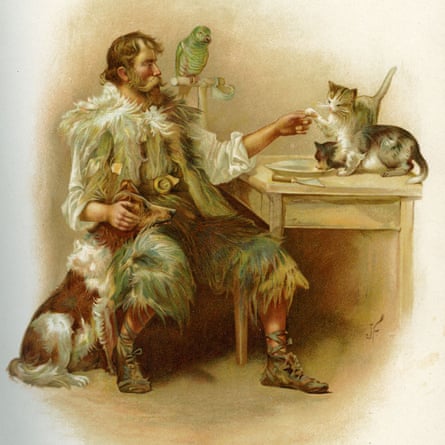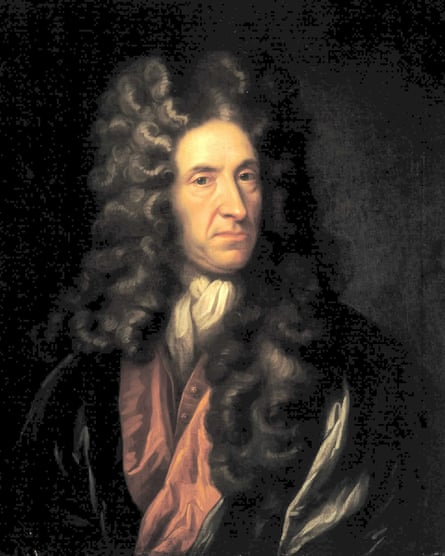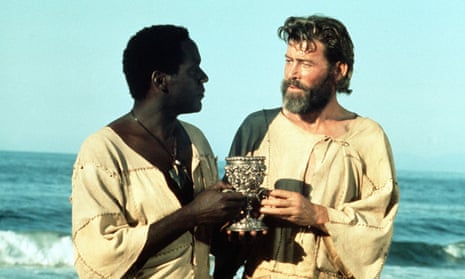In February 1719, two months before the publication of Robinson Crusoe, Daniel Defoe proposed in the Weekly Journal that the South Sea Company – founded just eight years earlier to manage the national debt and awarded a contract to supply the Spanish colonies in Latin America with several thousand African slaves per year – should oversee the founding of a British colony at the mouth of the River Orinoco on the coast of present day Venezuela. The government would be required “to furnish six Men of War, and 4000 regular Troops, with some Engineers and 100 pieces of Cannon, and military Stores in Proportion for the maintaining and supporting the Design”, but “the Revenue it shall bring to the Kingdom will be a full amends”. Defoe chose to locate the fictional island on which Crusoe is stranded around 40 miles from the mouth of the Orinoco, and furnish it with a kindlier climate than that of the actual island on which Alexander Selkirk, the presumed model for Crusoe, was marooned. His book (no one was calling it a “novel” at the time) was a prospectus for potential investors, lacking only glossy photos of beaches and palm trees.
Bribery and insider dealing combined with public credulity to drive the share price of the South Sea Company unsustainably high, and in 1720 the bubble burst, causing widespread financial ruin. Defoe’s Robinson Crusoe – which recounts, in addition to Crusoe’s diligent labours on the island, his skirmishes with cannibals and a crew of English mutineers, his rescue and a perilous overland journey from Lisbon to bring home the fortune that has been accumulating during his absence – would have been a better investment. By late summer 1719 the book had been reprinted three times and Defoe had published a sequel, The Farther Adventures of Robinson Crusoe. A third volume, Serious Reflections During the Life and Surprising Adventures of Robinson Crusoe, followed in 1720. By the end of the 19th century, the original Crusoe had been reissued in several hundred editions and the book had come to resemble, as Virginia Woolf wrote, “one of the anonymous productions of the race rather than the effort of a single mind”. During the 20th century, Defoe’s original template was turned upside down and inside out – by, among many others, HG Wells, Jean Giraudoux, William Golding, JG Ballard and Julio Cortázar – in ways that reflected changing attitudes to race, gender, imperialism, rationality and the environment.
In Michel Tournier’s Friday, or, The Other Island (1967), Robinson comes to perceive the island not as “a territory to be exploited but a being, unquestionably feminine”; mandrakes grow on the slope where Robinson has sex with the earth and “a new man seemed to be coming to life within him, wholly alien to the practical administrator”. In Sam Selvon’s Moses Ascending (1975), Moses takes over a run-down house in Shepherd’s Bush and has his practical affairs attended to “by my man Friday, a white immigrant from somewhere in the Midlands … He was a willing worker, eager to learn the ways of the Black man.” In JM Coetzee’s Foe (1986), Susan Barton tells Mr Foe, a writer she has engaged to bring her adventures to book, that “The true story will not be heard till by art we have found a way of giving voice to Friday” – whose tongue has been cut out, either by the slavers who transported him from Africa or by Crusoe himself.

There have also been adaptations for the stage, film, TV and online gaming, but the particular status of Robinson Crusoe in English culture derives chiefly from the early abridgements and retellings published for children. In Émile (1762), Jean-Jacques Rousseau described Crusoe as “the most felicitous treatise on natural education” ever written. However, the text that will provide “both Émile’s instruction and entertainment” is to be “disencumbered of all its rigmarole”. Crusoe’s career as a slave trader and owner of a plantation in Brazil is omitted. Many other educationists agreed that the island narrative of Crusoe was an ideal text for teaching the virtues of self-reliance, careful management of resources and trust in the overall – if a little mysterious, but that’s a part of the appeal – wonderfulness of the Christian God. That the novel could be harnessed to the business of empire was a further recommendation. The introduction to a 1900 Cambridge University Press edition encouraged readers to admire “those qualities of resourcefulness, activity and practical common sense that have made Great Britain the greatest colonising power in the world”. In 1903, Thomas Godolphin Rooper – educated at Harrow and Oxford, a schools inspector for 25 years – declared “Nothing, not even football, will do more to maintain and extend the dominion of the Anglo-Saxon than the spirit of Defoe’s Robinson Crusoe, which may be summed up in this piece of advice: ‘Never look to others to do for you what you can do for yourself.’”
¶
Did Rooper, I wonder, wash his own clothes, bake his own bread, mend his own roof? His summary of Crusoe-ism is a mockery of the way Defoe’s novel was actually incorporated into the ethos of British public schools, where the earnest Victorian schoolmen who considered Crusoe’s labours on his island to be an exemplary form of self-reliance taught their charges to read Latin and be dependent on the work of servants and women. For all its nod to Crusoe the manufacturer, able to knock up his own furniture and fences (walls are a speciality), the education system’s interest in him had nothing to do with manual labour, skilled or not. It had to do with maintaining the class hierarchy and extending “the dominion of the Anglo-Saxon”.
On his tight little island, Crusoe became a monarch: “My island was now peopled, and I thought myself very rich in subjects; and it was a merry reflection which I frequently made, how like a king I look’d.” The moral of the story appeared to be: work hard and trust in God and you shall have dominion over others. But the promotion of Robinson Crusoe in schools was a con trick: there cannot be kings without subjects, and for most of those doing the work and the trusting in God – even those lucky enough to be born white and male and in the rich west – the promise of dominion is not fulfillable, and never was. At the end of Defoe’s novel Crusoe is rich, but his wealth has accrued not from his own labour but from that of his slaves on his plantation in Brazil.
A chauvinistic take on Robinson Crusoe, a very selective obsession with the cultures of ancient Greece and Rome, and complete isolation from the opposite sex: at the posh end of the education system, an end that for generations was reserved exclusively for boys, this was a toxic mix. Long after the British empire had crumbled, it was a recipe designed to perpetuate the racism, sexism and unearned entitlement on which the empire had subsisted. Robinson Crusoe’s place in this mix was abetted by its status as (arguably) the first English novel and by the status accorded to literature within the culture. Simple in design, with strong contrasting colours overriding any psychological shading, Crusoe became a flag for empire and travelled in the luggage of merchants, missionaries and generals.
The early history of the English novel coincided with the expansion of the British empire and literature became a subject for academic study, with all the apparatus of professorships and certificates, when the empire was at its height. The aptly named Walter Raleigh, who was appointed in 1904 to the newly established chair of English literature at Oxford University, wrote with pride about these links: “We have spread ourselves over the surface of the habitable globe, and have established our methods of government in new countries. But the poets are still ahead of us, pointing the way. It was they, and no others, who first conceived the greatness of England’s destinies, and delivered the doctrine that was to inspire her.” Within the academy, this triumphalist habit of thinking was challenged in the 1970s and 80s by critical theory, which argued that literary works cannot be independent of the social and political conditions of their making, and that they propagate the assumptions of dominant status groups. But outside the academy there is still a vague belief that literature is, in some moral if not medicinal way, good for you, and English literature is the best on the market: beware of imitations.
¶
Crusoe: “I descended a little on the side of that delicious vale, surveying it with a secret kind of pleasure (tho’ mixt with my other afflicting thoughts) to think that this was all my own, that I was king and lord of this country indefeasibly, and had a right of possession.” The poster boy: white man, muscular and ageless, lord of his sunlit island by a sort of divine right (and in “delicious vale” and “secret kind of pleasure” there is surely sexual as well as territorial “right of possession” being claimed).

Crusoe had a great PR team. Billed as an emblematic Englishman, he is barely English (“my father being a foreigner of Bremen”) and is as much an immigrant on his island as the black man he makes his servant. Billed as a homemaker, Crusoe could hardly wait to quit the homes of, first, his parents and then (in The Farther Adventures) his own family. On his island he was hard-working and God-fearing, but he wasn’t an especially good man. Before the island, he was a slave trader; and when he and a Moorish boy, escaping from their Turkish captors, are rescued by a Portuguese ship, Crusoe sells the boy to the ship’s captain. After the island, in The Farther Adventures, his attitude to non-white people remained the same: “I look’d upon these savages as slaves, and people who, had we any work for them to do, we would ha’ used as such, or would ha’ been glad to have transported them to any other part of the world; for our business was to get rid of them, and we would all have been satisfy’d, if they had been sent to any country, so that they had never seen their own.” An English seaman who “had taken a little liberty with a wench” in Madagascar (he raped her) is killed by the local people. In revenge, the English “kill’d or destroy’d about 150 people, men, women, and children, and left not a house standing in the town”; Crusoe thinks they have gone too far, but the boatswain assures him “that they did nothing but what was just, and what the laws of God allow’d to be done to murtherers”.
In 1719, Robinson Crusoe brought on to the page certain assumptions of its time – that slavery is OK and can be squared with Christianity; that the function of women in society is to serve men; that people whose skin colour is not white are savages – and did not challenge them. The book’s lasting popularity, not least among those in a position to decide what should be popular, which books to offer to children (Crusoe) and which not (Moll Flanders), largely derives from this failure to challenge, and the elevation of Robinson Crusoe into the canon of English literature has perpetuated its own assumptions about what is “normal”, which is then argued as the “natural” way of things.
The argument here is not with Defoe, who was a clever and contrary man. His acceptance of slavery as necessary for profitable business is one thing; his belief that Britain is a nation of immigrants and his championing of education for women are others. Nor is the argument with the novel itself, which is just dull: there’s not much of a story and the writing is pedestrian. Walter de la Mare admired Defoe but struggled to defend his style: “The best perhaps that can be said of Defoe’s prose is that it served his multifarious purposes; but as he seldom seems to have attempted feats much beyond his workaday scope, it is apt to sink below a certain level rather than to rise above it.” Robert Louis Stevenson, comparing Robinson Crusoe to Samuel Richardson’s Clarissa, found in Defoe “not a tenth part of the style nor a thousandth part of the wisdom”. EM Forster, rereading Crusoe as an adult, found “No gaiety wit or invention … Boy scout manual.” My quarrel is with the way the novel has been used, and continues to be used to underpin the white male entitlement that is still evident in so many daily transactions in the UK: in who cleans the streets and the sheets and the toilets; who is served, who serves; in the gender pay gap; in the policies of the Conservative party relating not just to immigration but to every aspect of social welfare. Those are obvious examples. There are others buried so deep in the mindset of the past 300 years that most of the time they are invisible.
Crusoe himself is two-dimensional, a cardboard figure on to whom every reader can project their identity. By denying him a sexual dimension and also self-doubt, Defoe infantilised him. Crusoe in turn can infantilise his readers. He saved himself but he couldn’t save others. A man who was stuck on an uninhabited island for 28 years and who traded in slaves and reckoned women should be “proper for service” was never going to be much help as a role model for how to live with others, in society. Let him go.
Good Morning, Mr Crusoe by Jack Robinson (a pen-name of Charles Boyle) is published by CB editions.

Comments (…)
Sign in or create your Guardian account to join the discussion